(完整版)小学英语一般疑问句和特殊疑问句(附练习题)(最新整理)
(完整版)英语一般疑问句和特殊疑问句的讲解及练习

一般疑问句用be动词(am /is主语+其他成分,+主语+提问的词.否定:No,+主语+提问的词+not.Are you from Japan﹖Yes ,I am./ No, I'm not.Is her sister doing her homework now﹖Yes, she is./ No, she isn't.Does he work in a bank﹖Yes, he does./ No, he doesn't.Can you speak French﹖Yes, I can./ No, I can't.一: 般疑问句还有下列特点:1、以be动词、助动词或情态动词开头;例:Is your father a teacher? Does Catherine like animals? Can Jenny speak French?二: 如何将陈述句变成一般疑问句?1.如句中有be 动词(am、is、are、was、were can、may、must …)或助动词(do、does、did、have、had(完成时中))时,可直接将它们提到句首,句末打上问号即可。
主语为第一人称,应将其改为第二人称。
例:It was rainy yesterday.→Was it rainy yesterday?Tom's father can play the piano.→Can Tom's father play the piano?I have finished my homework.→Have you finished your homework?2.如果句中没有be动词、助动词或情态动词,则根据谓语动词的形式借助do的相应形式放在句首。
具体方法是:如果谓语动词是原形,则借do;如果谓语动词是一般现在时第三人称单数形式,则借does;如果谓语动词是过去式,则借did. 需要注意的是,借does或did后,原句的谓语动词要变回原形。
(完整版)英语一般疑问句和特殊疑问句的讲解及练习(最新整理)

一般疑问句用Yes 或No 作答的疑问句叫一般疑问句。
其结构是be 动词(am /is /are ) /助动词/情态动词+主语+其他成分通常回答为:肯定:Yes,+主语+提问的词.否定:No,+主语+提问的词+not.Are you from Japan﹖Yes ,I am./ No, I'm not.Is her sister doing her homework now﹖Yes, she is./ No, sheisn't.Does he work in a bank﹖Yes, he does./ No, he doesn't.Can you speak French﹖Yes, I can./ No, I can't.一: 般疑问句还有下列特点:1、以be 动词、助动词或情态动词开头;例:Is your father a teacher? Does Catherine like animals? Can Jenny speak French?二: 如何将陈述句变成一般疑问句?要将陈述句变成一般疑问句,可以遵循下列步骤:1.如句中有be 动词(am、is、are、was、were)情态动词(can、may、must …)或助动词(do、does、did、 have、had(完成时中))时,可直接将它们提到句首,句末打上问号即可。
主语为第一人称,应将其改为第二人称。
例:It was rainy yesterday.→Was it rainy yesterday?Tom's father can play the piano.→Can Tom's father play the piano?I have finished my homework.→Have you finished your homework?2.如果句中没有be 动词、助动词或情态动词,则根据谓语动词的形式借助do 的相应形式放在句首。
小学英语一般疑问句和特殊疑问句(附练习题)
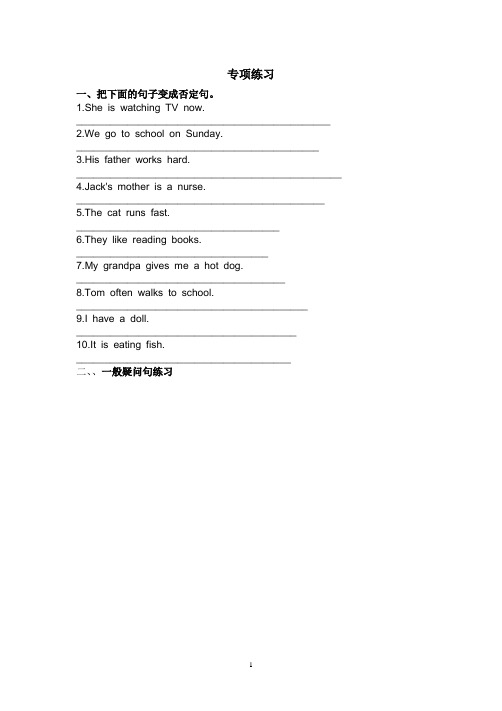
专项练习一、把下面的句子变成否定句。
1.She is watching TV now._____________________________________________ 2.We go to school on Sunday.___________________________________________3.His father works hard._______________________________________________ 4.Jack's mother is a nurse.____________________________________________ 5.The cat runs fast.____________________________________6.They like reading books.__________________________________7.My grandpa gives me a hot dog._____________________________________8.Tom often walks to school._________________________________________9.I have a doll._______________________________________10.It is eating fish.______________________________________二、、一般疑问句练习1. His father is an English teacher.2. These cats are crying.3. They can swim.4. I got to school on foot.5. His father goes to work by bus.6. Mrs. Li and Kitty can sing English songs..7. Kitty is wearing her new uniform.8. The two boys under the tree are hungry.9. Mrs. Li and Kitty watch television at night.10. I can finish my homework by myself.11. I have some good friends.12. I can write in English.二、特殊疑问句1、定义:以疑问词开头,对句中某一成分提问的句子叫特殊疑问句。
小学英语一般疑问句和特殊疑问句(附练习题)0001

般疑问句1、定义: 用Yes 或No 作答的疑问句叫一般疑问句。
2、特点:1、以be 动词am/is/are 助动词do/does、情态动词can/could/may、there be(即卩there is /are开头;例:Is your father a teacher?/ Does Tom like apples? /Can Jenny speak English? /Is there a book on the desk?2、往往读升调3、陈述句变成一般疑问句的方法:1>看陈述句中有没有be动词(am、is、are、was、were)或情态动词(can/could/may),如果有,将其提到句首,句末打上问号即可。
例:It is rainy nowf Is it rai ny now?Tom's father can play the piano.f Can Tom's father play the piano?There is a book on the desk.f Is there a book on the desk?2>如果句中没有be动词或情态动词,句首加do的相应形式(do、does、did),且原句的谓语动词要变回原形。
1. They go to school by bike. f Do they go to school by bike?2. Bill gets up at 6:30 every day. f Does bill gets up at 6:30 every day?3. The students saw a film yesterday. f Did the students see a film yesterday?注: 1.如果陈述句中有第一人称,则变问句时要变为第二人称。
I usually have lunch at school. —Do you usually have lunch at school?2.如果陈述句中有some, 则变问句时往往要变成any 。
(完整版)小学英语一般疑问句、否定句和特殊疑问(附习题)(可编辑修改word版)
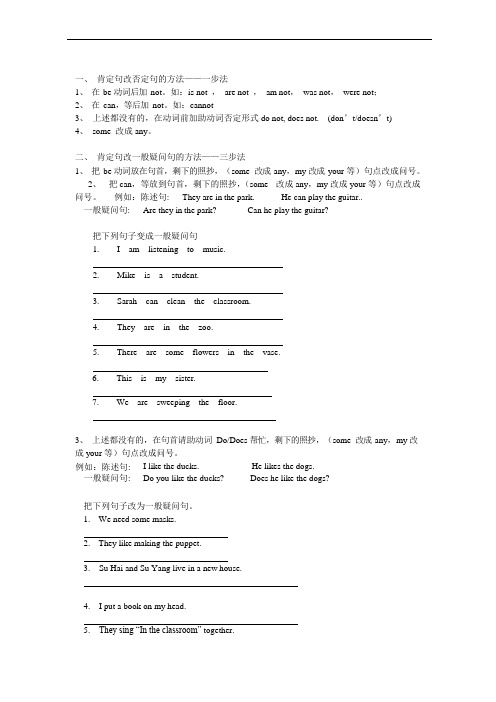
一、肯定句改否定句的方法——一步法1、在be 动词后加not。
如:is not ,are not ,am not,was not,were not;2、在can,等后加not。
如:cannot3、上述都没有的,在动词前加助动词否定形式do not, does not. (don’t/doesn’t)4、some 改成any。
二、肯定句改一般疑问句的方法——三步法1、把be 动词放在句首,剩下的照抄,(some 改成any,my 改成your 等)句点改成问号。
2、把can,等放到句首,剩下的照抄,(some 改成any,my 改成your 等)句点改成问号。
例如:陈述句: They are in the park. He can play the guitar..一般疑问句: Are they in the park? Can he play the guitar?把下列句子变成一般疑问句1. I am listening to music.2. Mike is a student.3. Sarah can clean the classroom.4. They are in the zoo.5. There are some flowers in the vase.6.This is my sister.7.We are sweeping the floor.3、上述都没有的,在句首请助动词Do/Does 帮忙,剩下的照抄,(some 改成any,my 改成your 等)句点改成问号。
例如:陈述句: I like the ducks. He likes the dogs.一般疑问句: Do you like the ducks? Does he like the dogs?把下列句子改为一般疑问句。
1.We need some masks.2.They like making the puppet.3.Su Hai and Su Yang live in a new house.4.I put a book on my head.5.They sing “In the classroom” together.6.We play basketball on Sundays.7.Tom likes listening to music三、肯定句改特殊疑问句的方法——四步法1、在一般疑问句的基础上,句首添加一个疑问词即可,可根据划线部分确定是什么疑问词。
小学英语一般疑问句和特殊疑问句精讲及练习

一、一般疑问句1、以be动词、助动词或情态动词开头;例:Is your father a teacher? Does Catherine like animals?Can Jenny speak French?2、译成汉语,都可以带上“吗”,例如上面三句可分别译为:你父亲是老师吗?凯瑟琳喜欢动物吗?3、陈述句有没有be动词(am、is、are、was、were)、助动词(do、does、did、have、had)或情态动词(can、must、will、may等),如果有,将其提到句首,句末打上问号即可。
例:It was rainy yesterday. →Was it rainy yesterday?Tom's father can play the piano. →Can Tom's father play the piano?I have got some coffee in the fridge.→Have you got any coffee in the fridge?2.如果句中没有be动词、助动词或情态动词,则加do、does、did.需要注意的是,加does或did后,原句的谓语动词要变回原形。
例:They go to school by bike. →Do they go to school by bike?Bill gets up at 6:30 every day.→Does bill get up at 6:30 every day?The students saw a film yesterday. →Did the students see a film yesterday?二、常用的特殊疑问词有:三、小学阶段,特殊疑问句句型结构有:1、特殊疑问词+助动词+主语+动词原形+其他?Where do you do study English?2、特殊疑问词+be动词+主语+其他?Why is your Mum so angry?3、特殊疑问词+情态动词+主语+动词原形+其他?What can I do for you?四、练习一、在横线上填上适当的疑问代词1、A: is the boy in blue? B:He’s Mike.2、A: pen is it? B:It’s mine.3、A: is the diary? B:It’s under the chair.4、A: balls do you have? B: 13.5、A: are the earphones? B:They are 25 yuan.6、A: is the cup? B:It’s blue.7、A: is it today? B:It’s Sunday.8、A: was it yesterday? B: It was the 13th of October.9、A: this red one? B:It’s beautiful.10、A: is your cousin? B: He’s 15 years old.11、A: do you have dinner? B: At 6 o’clock.二、把下列句子改为一般疑问句。
完整版)小学一般疑问句和特殊疑问句练习题
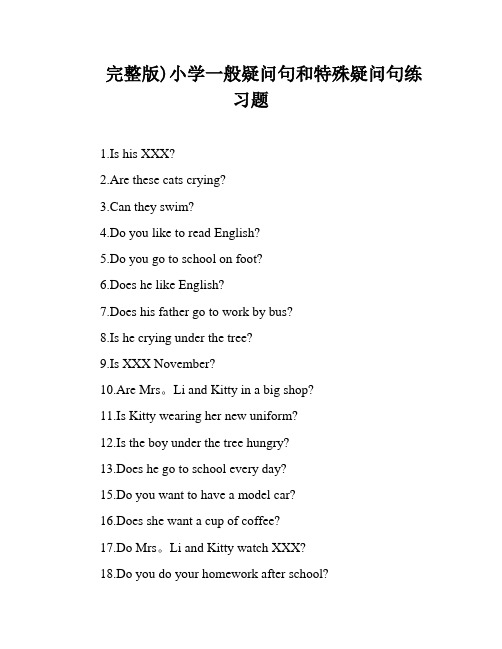
完整版)小学一般疑问句和特殊疑问句练习题1.Is his XXX?2.Are these cats crying?3.Can they swim?4.Do you like to read English?5.Do you go to school on foot?6.Does he like English?7.Does his father go to work by bus?8.Is he crying under the tree?9.Is XXX November?10.Are Mrs。
Li and Kitty in a big shop?11.Is Kitty wearing her new uniform?12.Is the boy under the tree hungry?13.Does he go to school every day?15.Do you want to have a model car?16.Does she want a cup of coffee?17.Do Mrs。
Li and Kitty watch XXX?18.Do you do your homework after school?1.Who is that pretty girl。
She is my sister.2.Where are Jack and Tom。
They are behind you.3.When do you go to school。
I go to school from Monday to Friday.4.Who has a beautiful flower。
John has a beautiful flower.5.Who are they。
They are my parents.6.Where is my mother。
She is in the living room.3.A: ______ _______ is your favorite color?B: XXX: ______ _______ is it today?B: It is Monday.5.A: ______ is your name?B: My name is John.二、改写每段话1.Who is he。
(完整版)小学英语一般疑问句和特殊疑问句(附练习题)
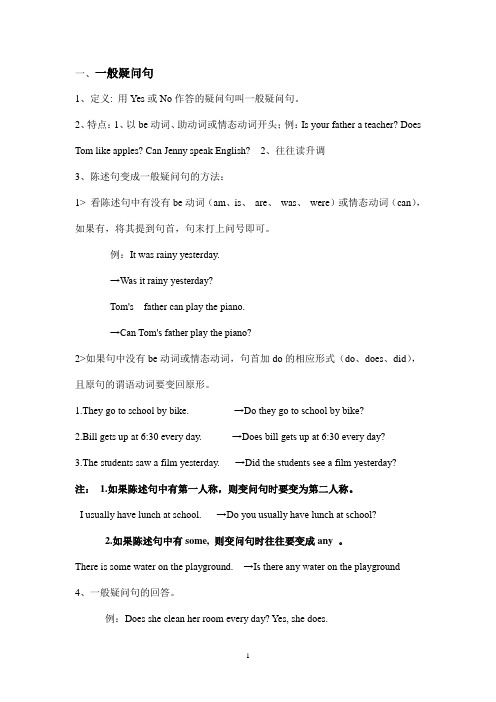
一、一般疑问句1、定义: 用Yes或No作答的疑问句叫一般疑问句。
2、特点:1、以be动词、助动词或情态动词开头;例:Is your father a teacher? Does Tom like apples? Can Jenny speak English? 2、往往读升调3、陈述句变成一般疑问句的方法:1> 看陈述句中有没有be动词(am、is、are、was、were)或情态动词(can),如果有,将其提到句首,句末打上问号即可。
例:It was rainy yesterday.→Was it rainy yesterday?Tom's father can play the piano.→Can Tom's father play the piano?2>如果句中没有be动词或情态动词,句首加do的相应形式(do、does、did),且原句的谓语动词要变回原形。
1.They go to school by bike. →Do they go to school by bike?2.Bill gets up at 6:30 every day. →Does bill gets up at 6:30 every day?3.The students saw a film yesterday. →Did the students see a film yesterday?注: 1.如果陈述句中有第一人称,则变问句时要变为第二人称。
I usually have lunch at school. →Do you usually have lunch at school?2.如果陈述句中有some, 则变问句时往往要变成any 。
There is some water on the playground. →Is there any water on the playground4、一般疑问句的回答。
一般疑问句和特殊疑问句 (附练习题及答案

How do you go home?
On foot.
how old
多大
问年龄
How old is he?
6 years old.
how many
多少
问数量
How many books are there in the bookcase?
There are 10.
how much
多少
问价钱
How much is the book?
9. Mrs. Li and Kitty watch television at night.
Do Mrs. Li and Kitty watch television at night? Yes, they do. / No, they don’t.
10. I can finish my homework by myself.
中小学英语一般疑问句和特殊疑问句详解(附练习题及答案)
一、一般疑问句
1、定义:用Yes或No作答的疑问句叫一般疑问句。
2、特点:
1>以be动词am/is/are、助动词do/does、情态动词can/could/may、there be(即there is /are)开头;
例:Is your father a teacher?/ Does Tom like apples? /Can Jenny speak English? /Is there a book on the desk?
There is a book on the desk.→Is there a book on the desk?
2>如果句中没有be动词或情态动词,句首加do的相应形式(do、does、did),且原句的谓语动词要变回原形。
小学英语一般疑问句和特殊疑问句(附练习题)
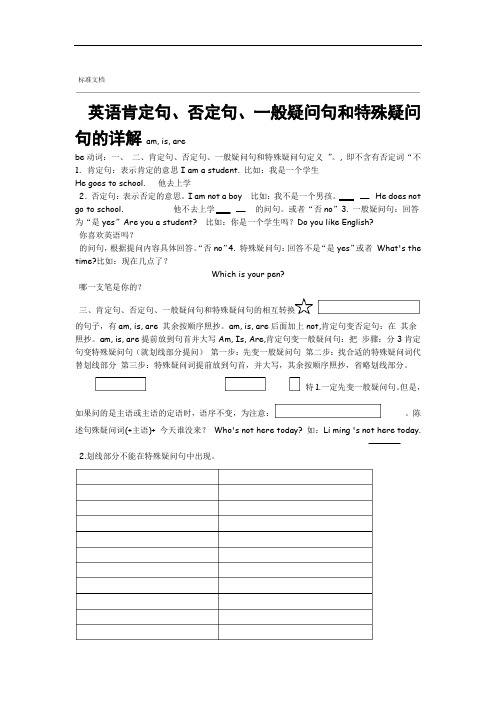
标准文档英语肯定句、否定句、一般疑问句和特殊疑问句的详解am, is, arebe动词:一、二、肯定句、否定句、一般疑问句和特殊疑问句定义”。
, 即不含有否定词“不1.肯定句:表示肯定的意思I am a student. 比如:我是一个学生He goes to school. 他去上学2.否定句:表示否定的意思。
I am not a boy 比如:我不是一个男孩。
He does not go to school. 他不去上学的问句。
或者“否no”3. 一般疑问句:回答为“是yes”Are you a student? 比如:你是一个学生吗?Do you like English?你喜欢英语吗?的问句,根据提问内容具体回答。
“否no”4. 特殊疑问句:回答不是“是yes”或者What's the time?比如:现在几点了?Which is your pen?哪一支笔是你的?三、肯定句、否定句、一般疑问句和特殊疑问句的相互转换的句子,有am, is, are 其余按顺序照抄。
am, is, are后面加上not,肯定句变否定句:在其余照抄。
am, is, are提前放到句首并大写Am, Is, Are,肯定句变一般疑问句:把步骤:分3肯定句变特殊疑问句(就划线部分提问)第一步:先变一般疑问句第二步:找合适的特殊疑问词代替划线部分第三步:特殊疑问词提前放到句首,并大写,其余按顺序照抄,省略划线部分。
特1.一定先变一般疑问句。
但是,如果问的是主语或主语的定语时,语序不变,为注意:。
陈述句殊疑问词(+主语)+ 今天谁没来?Who's not here today? 如:Li ming 's not here today.2.划线部分不能在特殊疑问句中出现。
what date 什么日期什么时间(问时间)问具体日期whenwhat place什么地点问具体地址who 谁(问人)how …怎么样问情况whose 谁的问主人how old 多大问年龄在哪里where 问地点how many 多少问选择问数量which 哪一个how much why 为什么多少问价钱问原因how about …怎么样问意见what 什么问东西how far 多远问时间什么时间what time 问路程问时间多长how long 问颜色什么颜色what colourwhat about…怎么样问时间多快,多久问意见How soon星期几what day 问频率问星期多久How often 例如:1.肯定句、否定句和一般疑问句的互换This is a book. 肯定句:This is not a book.否定句:实用大全.标准文档Is this a book? 一般疑问句:肯定回答:Yes, it is.否定回答:No, it isn't.) (变特殊疑问句2.就划线部分提问This is a book.Is this a book? 第一步:变一般疑问句Is this what ?第二步:找合适的特殊疑问词第三步:特殊疑问词提前放到句首,并大写,其余按顺序照抄,省略划线部分。
小学英语一般疑问句和特殊疑问句附练习题

汇报人:XX
目录
01 单问句练习题
添加章节标题
小学英语疑问 句类型
一般疑问句
定义:以助动词、情态动词或be动词开头,表示询问事实或观点的疑问 句。 结构:助动词/情态动词/be动词+主语+谓语+其他?
示例:Do you like apples?(你喜欢苹果吗?)
添加 标题
例子:What time does the train arrive?(火车什么时候到达?)
小学英语疑问 句练习题
一般疑问句练习题
Do you like apples? Is this your book? Can you swim? Are you a student?
特殊疑问句练习题
什么是特殊疑问句? 特殊疑问句的结构是什么? 特殊疑问句的常见形式有哪些? 如何回答特殊疑问句?
感谢您的观看
汇报人:XX
练习题:将陈述句改为一般疑问句。
特殊疑问句
添加 标题
定义:特殊疑问句是用来对句子中的某一 特定部分提问的疑问句,通常以“what”、 “when”、“where”、“why”、 “how”等疑问词开头。
添加 标题
结构:特殊疑问句的结构为“疑问词+助 动词+主语+谓语+其他成分”。
添加 标题
用法:特殊疑问句通常用于获取具体信息, 例如询问时间、地点、原因等。
(完整word版)小学英语一般疑问句、否定句和特殊疑问(附习题)
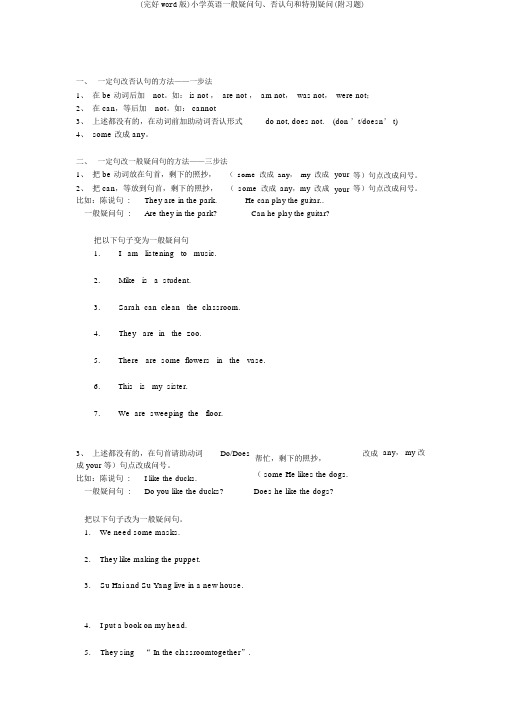
一、一定句改否认句的方法——一步法1、在 be 动词后加not。
如: is not , are not , am not, was not, were not;2、在 can,等后加not。
如: cannot3、上述都没有的,在动词前加助动词否认形式do not, does not.(don ’t/doesn’ t)4、 some 改成 any。
二、一定句改一般疑问句的方法——三步法1、把 be 动词放在句首,剩下的照抄,(some改成any,my改成2、把 can,等放到句首,剩下的照抄,(some改成any,my改成比如:陈说句 :They are in the park.He can play the guitar..一般疑问句 :Are they in the park?Can he play the guitar? youryour等)句点改成问号。
等)句点改成问号。
把以下句子变为一般疑问句1.I am listening to music._______________________________________ 2.Mike is a student._______________________________________ 3.Sarah can clean the classroom.________________________________________ 4.They are in the zoo.________________________________________ 5.There are some flowers in the vase.________________________________________ 6.This is my sister._________________________________________ 7.We are sweeping the floor.__________________________________________3、上述都没有的,在句首请助动词Do/Does 成 your 等)句点改成问号。
(完整版)小学英语一般疑问句、否定句和特殊疑问(附习题)

一、肯定句改否定句的方法——一步法1、在be动词后加not。
如:is not ,are not ,am not,was not,were not;2、在can,等后加not。
如:cannot3、上述都没有的,在动词前加助动词否定形式do not, does not. (don’t/doesn’t)4、some 改成any。
二、肯定句改一般疑问句的方法——三步法1、把be动词放在句首,剩下的照抄,(some 改成any,my改成your等)句点改成问号。
2、把can,等放到句首,剩下的照抄,(some 改成any,my改成your等)句点改成问号。
例如:陈述句: They are in the park. He can play the guitar..一般疑问句: Are they in the park? Can he play the guitar?把下列句子变成一般疑问句1.I am listening to music._______________________________________2.Mike is a student._______________________________________3.Sarah can clean the classroom.________________________________________4.They are in the zoo.________________________________________5. There are some flowers in the vase.________________________________________6. This is my sister._________________________________________7. We are sweeping the floor.__________________________________________3、上述都没有的,在句首请助动词Do/Does帮忙,剩下的照抄,(some 改成any,my改成your等)句点改成问号。
(完整版)小学英语一般疑问句、否定句和特殊疑问(附习题)(可编辑修改word版)

(完整版)⼩学英语⼀般疑问句、否定句和特殊疑问(附习题)(可编辑修改word版)⼀、肯定句改否定句的⽅法——⼀步法1、在be 动词后加not。
如:is not ,are not ,am not,was not,were not;2、在can,等后加not。
如:cannot3、上述都没有的,在动词前加助动词否定形式do not, does not. (don’t/doesn’t)4、some 改成any。
⼆、肯定句改⼀般疑问句的⽅法——三步法1、把be 动词放在句⾸,剩下的照抄,(some 改成any,my 改成your 等)句点改成问号。
2、把can,等放到句⾸,剩下的照抄,(some 改成any,my 改成your 等)句点改成问号。
例如:陈述句: They are in the park. He can play the guitar..⼀般疑问句: Are they in the park? Can he play the guitar?把下列句⼦变成⼀般疑问句1. I am listening to music.2. Mike is a student.3. Sarah can clean the classroom.4. They are in the zoo.5. There are some flowers in the vase.6.This is my sister.7.We are sweeping the floor.3、上述都没有的,在句⾸请助动词Do/Does 帮忙,剩下的照抄,(some 改成any,my 改成your 等)句点改成问号。
例如:陈述句: I like the ducks. He likes the dogs.⼀般疑问句: Do you like the ducks? Does he like the dogs?把下列句⼦改为⼀般疑问句。
1.We need some masks.2.They like making the puppet.3.Su Hai and Su Yang live in a new house.4.I put a book on my head.5.They sing “In the classroom” together.6.We play basketball on Sundays.7.Tom likes listening to music三、肯定句改特殊疑问句的⽅法——四步法1、在⼀般疑问句的基础上,句⾸添加⼀个疑问词即可,可根据划线部分确定是什么疑问词。
(完整word版)一般疑问句和特殊疑问句练习题
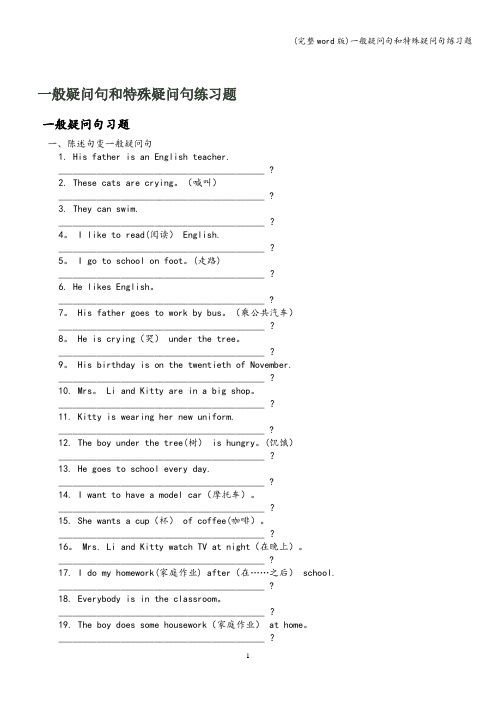
一般疑问句和特殊疑问句练习题一般疑问句习题一、陈述句变一般疑问句1. His father is an English teacher.___________________________________________ ?2. These cats are crying。
(喊叫)___________________________________________ ?3. They can swim.___________________________________________ ?4。
I like to read(阅读) English.___________________________________________ ?5。
I go to school on foot。
(走路)___________________________________________ ?6. He likes English。
___________________________________________ ?7。
His father goes to work by bus。
(乘公共汽车)___________________________________________ ?8。
He is crying(哭) under the tree。
___________________________________________ ?9。
His birthday is on the twentieth of November.___________________________________________ ?10. Mrs。
Li and Kitty are in a big shop。
___________________________________________ ?11. Kitty is wearing her new uniform.___________________________________________ ?12. The boy under the tree(树) is hungry。
小学英语一般疑问句和特殊疑问句(附练习题)
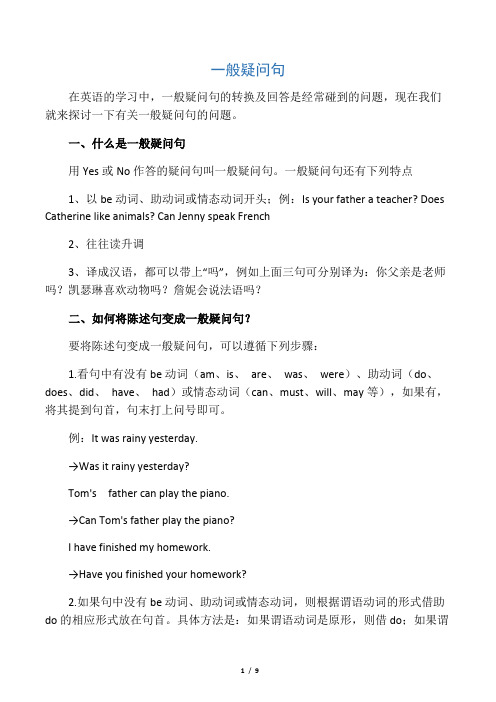
一般疑问句在英语的学习中,一般疑问句的转换及回答是经常碰到的问题,现在我们就来探讨一下有关一般疑问句的问题。
一、什么是一般疑问句用Yes或No作答的疑问句叫一般疑问句。
一般疑问句还有下列特点1、以be动词、助动词或情态动词开头;例:Is your father a teacher? Does Catherine like animals? Can Jenny speak French2、往往读升调3、译成汉语,都可以带上“吗”,例如上面三句可分别译为:你父亲是老师吗?凯瑟琳喜欢动物吗?詹妮会说法语吗?二、如何将陈述句变成一般疑问句?要将陈述句变成一般疑问句,可以遵循下列步骤:1.看句中有没有be动词(am、is、are、was、were)、助动词(do、does、did、have、had)或情态动词(can、must、will、may等),如果有,将其提到句首,句末打上问号即可。
例:It was rainy yesterday.→Was it rainy yesterday?Tom's father can play the piano.→Can Tom's father play the piano?I have finished my homework.→Have you finished your homework?2.如果句中没有be动词、助动词或情态动词,则根据谓语动词的形式借助do的相应形式放在句首。
具体方法是:如果谓语动词是原形,则借do;如果谓语动词是一般现在时第三人称单数形式,则借does;如果谓语动词是过去式,则借did. 需要注意的是,借does或did后,原句的谓语动词要变回原形。
例:They go to school by bike.→Do they go to school by bike?Bill gets up at 6:30 every day.→Does bill gets up at 6:30 every day?The students saw a film yesterday.→Did the students see a film yesterday?三.陈述句变一般疑问句应注意的事项陈述句变成一般疑问句除了遵循上述规则以外,还应注意下列几点:1.如果陈述句中有第一人称,则变问句时最好要变为第二人称。
- 1、下载文档前请自行甄别文档内容的完整性,平台不提供额外的编辑、内容补充、找答案等附加服务。
- 2、"仅部分预览"的文档,不可在线预览部分如存在完整性等问题,可反馈申请退款(可完整预览的文档不适用该条件!)。
- 3、如文档侵犯您的权益,请联系客服反馈,我们会尽快为您处理(人工客服工作时间:9:00-18:30)。
一、一般疑问句
1、定义:用Yes 或No 作答的疑问句叫一般疑问句。
2、特点:1、以be 动词、助动词或情态动词开头;例:Is your father a teacher? Does Tom like apples? Can Jenny speak English? 2、往往读升调
3、陈述句变成一般疑问句的方法:
1> 看陈述句中有没有be 动词(am、is、are、was、were)或情态动词(can),如果有,将其提到句首,句末打上问号即可。
例:It was rainy yesterday.
→Was it rainy yesterday?
Tom's father can play the piano.
→Can Tom's father play the piano?
2>如果句中没有be 动词或情态动词,句首加do 的相应形式(do、does、did),且原句的谓语动词要变回原形。
1.They go to school by bike. →Do they go to school by bike?
2.Bill gets up at 6:30 every day. →Does bill gets up at 6:30 every day?
3.The students saw a film yesterday. →Did the students see a film yesterday? 注:1.如果陈述句中有第一人称,则变问句时要变为第二人称。
I usually have lunch at school. →Do you usually have lunch at school?
2.如果陈述句中有some, 则变问句时往往要变成any 。
There is some water on the playground. →Is there any water on the playground
4、一般疑问句的回答。
例:Does she clean her room every day? Yes, she does.
Is Anna′s father a doctor? No,he isn′t.
Can she dance? Yes,she can..
如果问句主语是this that,回答时用it 代替;若问句主语是these, those,回答时用they 代替。
--Is this your bag?
--Yes, it is ./ No, it isn’t.
--Are those your books?
--Yes, they are. / No, they aren’t.
练习:
1.His father was an English teacher.
2.These cats are crying.
3.They can swim.
4.I went to school on foot.
5.His father goes to work by bus.
6.Mrs. Li and Kitty can sing English songs..
7.Kitty is wearing her new uniform.
8.The two boys under the tree were hungry.
9.Mrs. Li and Kitty watch television at night.
10.I can finish my homework by myself.
11.I have some good friends.
12.They cleaned their rooms and finished their homework yesterday.
二、特殊疑问句
1、定义:以疑问词开头,对句中某一成分提问的句子叫特殊疑问句。
常用的疑
问词有:what ,who, whose,which, when, where,how, why 等。
2 、语序:
1.如疑问词作主语或是对主语提问,其语序是陈述句的语序:疑问词+谓语动
词+其他成分?
如:1)Who is singing in the room﹖2)Where is he?
2.如疑问词作其他成分,即对其他成分提问,其语序是:疑问词+一般疑问句?
如:1)what class are you in﹖2)What does she look like﹖
注:回答特殊疑问句时,不能用yes /no,即问什么答什么。
如:Where's the restaurant﹖It is near the station.
练习
一、选择正确的单词填空
(who, where, when,what)
1.is that pretty girl? She is my sister.
2.are Jack and Tom? They are behind you.
3.do you go to school? I go to school from Monday to Friday.
4. has a beautiful flower? John has a beautiful flower.
5.are they doing? They are cleaning their rooms.
6.is my mother? She is in the living room.
7.are you going to do tomorrow? We are going to swim.
8.do Jim and Wendy play ball? They play ball in the afternoon.
9. does he have for breakfast? He has milk and bread.
10. are you from? I'm from Changchun city.
二、就画线部分提问
1.H e is my father.
2.T hey are under the tree.
3.I often watch TV after dinner.(晚饭后)
4.L ily swims in the swimming pool.(游泳池)
5.S uperman flies in the sky.
6.I often brush my teeth in the evening.
7.A lan likes playing with Bill.
8.T he supermarket is near the school.
9.J ennifer has a pair of earrings(耳环).
10.The flowers are in the flower pot(花盆).
11.The monkey sleeps at night.
“”
“”
At the end, Xiao Bian gives you a passage. Minand once said, "people who learn to learn are very happy people.". In every wonderful life, learning is an eternal theme. As a professional clerical and teaching position, I understand the importance of continuous learning, "life is diligent, nothing can be gained", only continuous learning can achieve better self. Only by constantly learning and mastering the latest relevant knowledge, can employees from all walks of life keep up with the pace of enterprise development and innovate to meet the needs of the market. This document is also edited by my studio professionals, there may be errors in the document, if there are errors, please correct, thank you!。
